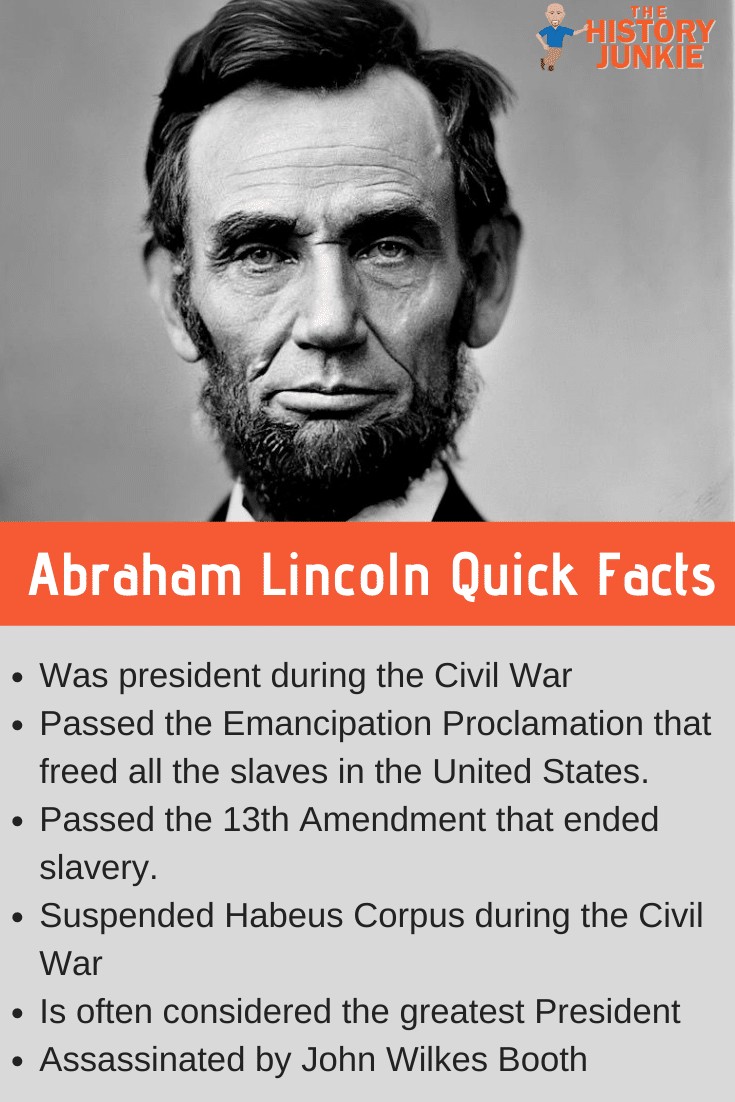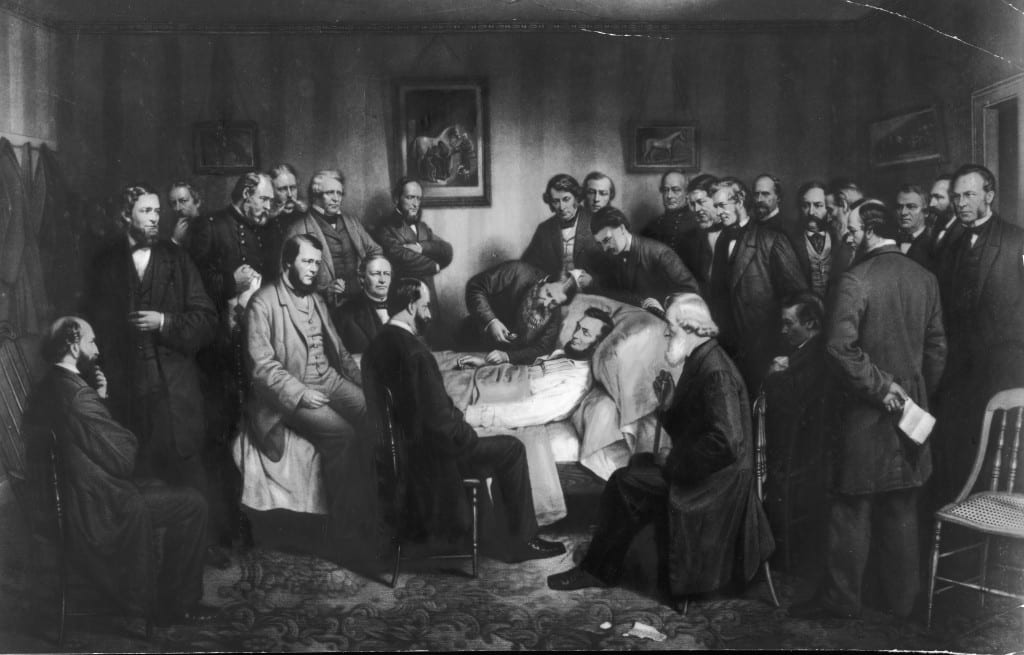Usually, when naming the greatest President in American History, the debate is between George Washington and Abraham Lincoln.

Abraham Lincoln became President after winning the Election of 1860. He would come to power in the most divided time in our nation's short history. At the announcement of his victory, southern states began to secede from the Union.
Jump to:
The nation would be thrown into the Civil War, in which Lincoln's leadership would be put to the test, and by the time he was assassinated, he had earned his place in world history.
First Term
March 4, 1861: Abraham Lincoln delivers his inaugural address to the Union. Within it, he says that he has no plans to interfere with slavery where it exists but that secession from the Union is illegal.
March 11, 1861: The South meets and creates the Confederate Constitution which is similar to the United States Constitution with the Bill of Rights. However, it prohibits any legislation banning slavery and gives more power to the states.
April 3, 1861: The first Pony Express run arrives in Sacramento, California. The service only lasted 6 months and was replaced with the transcontinental telegraph service
April 12-13, 1861: Fort Sumter is bombarded by the Confederates in South Carolina. The fort falls.
April 15, 1861: The Civil War officially began when Lincoln declared a state of insurrection and called up 75,000 troops.
April 17, 1861: In response to Lincoln's proclamation, Virginia secedes from the Union.
April 19, 1861: Lincoln adopts Winfield Scott's tactical plan and orders the blockade of Confederate Ports.
May 6, 1861: Arkansas secedes from the Union
May 10, 1861: A riot erupts in St. Louis, Missouri, due to the presence of 3,000 Union troops. Although under Union control, Missouri remained a hotbed of revolt throughout the Civil War.
May 20, 1861: North Carolina secedes from the Union.
May 21, 1861: Confederates move their capital from Montgomery, Alabama, to Richmond, Virginia.
June 8, 1861: Tennessee secedes from the Union
July 21, 1861: The First Battle of Bull Run takes place and ends with a Confederate victory under General Beauregard. During this battle, Thomas Jackson earned the nickname Stonewall Jackson.
July 25, 1861: Congress authorizes the recruitment of volunteers and offers soldiers $100 for two years of service.
September 14, 1861: The USS Colorado defeats the Steamer Judah off the coast of Florida near Pensacola.
October 31, 1861: General Winfield Scott retires as commander-in-chief of the army at the age of 75.
November 1, 1861: Lincoln appointed George B. McClellan as commander-in-chief of the United States Army.
February 20, 1862: Lincoln's son, Willie, dies of typhoid fever.
March 9, 1862: The Monitor and Merrimac clash. It would be the clash of the ironclads that would end in a draw. The innovations of these ships would begin to change the Navy forever.
April 16, 1862: Lincoln abolished slavery in the District of Columbia.
May 15, 1862: The Department of Agriculture is established.
May 20, 1862: The Homestead Act is passed, which enables any American citizen or applicant for citizenship to obtain ownership of land after having lived on it for five years.
June 1, 1862: Jefferson Davis appointed Robert E. Lee as commander of the Confederate Army of Northern Virginia.
July 1862: After capturing Fort Pulaski on Tybee Island, General David Hunter organized the first African-American regiment.
July 2, 1862: The Morrill Land-Grant College Act was passed. It provides federal land grants to state colleges that teach agriculture and the mechanical arts.
July 22, 1862: Lincoln announces to Congress that he plans to free all slaves in the Confederacy. On advice from his Secretary of State, he waited until a Union victory and then published the Emancipation Proclamation.
September 17, 1862: The Union defeats the Confederate army at the Battle of Antietam. Lincoln orders McClellan to pursue Lee and destroy him, but McClellan takes a more cautious approach and does nothing.

September 22, 1862: Lincoln announces that his Emancipation Proclamation will go into effect on January 1, 1863.
November 1862: Mid-term Congressional elections are held, and the Republicans maintain control of the house
January 1, 1863: The Emancipation Proclamation goes into effect and frees all the slaves in the Confederacy.
February 24, 1863: New Mexico Territory is divided, with the western portion becoming the Territory of Arizona.
February 25, 1863: The National Bank Act is passed. This helps promote war bonds and establishes a paper currency.
March 3, 1863: A national draft act is passed, which allows for draftees to hire a substitute for "$300". Lincoln also approved the establishment of the National Academy of Sciences and the Judiciary Act of 1863, which increased the number of Supreme Court Justices.
May 1-4, 1863: General Robert E. Lee defeats Union General Joseph Hooker at the Battle of Chancellorsville. However, Stonewall Jackson is accidentally shot by his own troops and dies on May 10.
May 3, 1863: Idaho Territory is established and later becomes the states of Idaho, Wyoming, and Montana.
June 20, 1863: West Virginia joins the Union as the 35th state.
July 1 - 5, 1863: The Battle of Gettysburg takes place and becomes the turning point of the war for the Union. Lee was soundly defeated and pushed back across the Union line and into the Confederacy.
April - July 1863: General Ulysses S. Grant captures Vicksburg, effectively cutting the Confederacy in half.
November 19, 1863: At the dedication of a national cemetery in Gettysburg, Lincoln delivers the Gettysburg Address.
December 8, 1863: Lincoln offers pardons to Southerners who take oaths of loyalty to the Union. The offer only applies to the common man and results in very few taking advantage.
May 7 - 20, 1863: Lee and Grant engage in weeks of fighting in Spotsylvania. The battle was a draw, but Grant quickly replenished his forces while General Lee was unable to do so.
June 7, 1863: Abraham Lincoln was nominated by the Republican party. Andrew Johnson was nominated as Vice President. During the Presidential Election of 1864, the Republican party campaigned for a constitutional amendment abolishing slavery.
June 28, 1864: The fugitive slave act is repealed
August 29, 1864: The Democrats nominated George McClellan as their presidential candidate.
September 1-2, 1864: General William Sherman captures Atlanta and burns the city to the ground.
October 31, 1864: Nevada is admitted to the Union.
November 8, 1864: Lincoln is re-elected as President.
November 16, 1864: Sherman begins his March to the Sea and plans to destroy anything in his path.
January 31, 1865: The 13th Amendment is passed, which calls for an end to slavery.
March 3, 1865: Congress created the Freedmen's Bureau to help freed African Americans in the South.
March 13, 1865: The Confederates began to recruit slaves into the army in a last-ditch effort to build manpower.
Second Term
March 4, 1865: Abraham Lincoln is inaugurated for the second time.
April 2, 1865: The Confederate Capital at Richmond is evacuated.
April 9, 1865: Lee surrendered to Grant at Appomattox Courthouse.
April 14, 1865: John Wilkes Booth shoots Lincoln at Ford's Theater in Washington, D.C.

April 15, 1865: Abraham Lincoln dies, and Andrew Johnson is sworn in as President.
